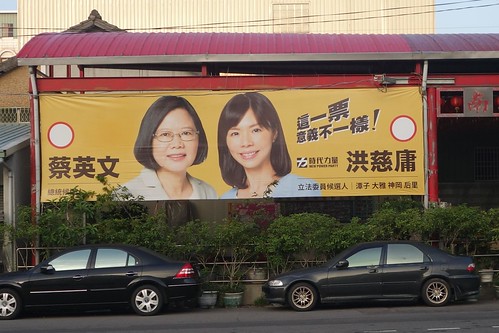Reuters: China's women struggle for power
One fifth of Chinese NPC parliamentarians are female, higher than the 17 percent of the U.S. Congress who are women. But China's parliament comes under the firm thumb of the Communist Party, where real power lies.At Ketagalan media: Gwen Wang on Taiwan's legislature:
All nine members of the Party's top ruling body, the Politburo Standing Committee, who marked the 100th anniversary of International Women's Day on Sunday, are men.
On gender balance, the percentage of women in the Legislature has increased to 38 per cent (43 seats), from 34 per cent (38 seats) in the previous Legislature. The outcome of the legislative race is described by Dr. Nathan Batto as “a victory for diversity”, with Taiwan now ranking 10th in the world in the proportion of women in its national legislature. The steady increase in Taiwanese women’s representation in the parliament shows that women are gradually gaining power in Taiwan’s political institutions.Me, a couple of weeks ago...
The KMT Chairmanship struggle is still a two woman race between Hung Hsiu-chu, the reactionary mainlander former presidential candidate, and Huang Min-hui, a Taiwanese faction politician from a family with long service to the KMT. Remarkable to think that if Chen Chu succeeds Tsai Ing-wen to the Chairmanship of the DPP, the president and heads of both major political parties will be female come May. This demonstrates not merely female power but continuity of female power, since the previous party heads will have both been female.From Emma Jinhua Teng, An Island of Women: The discourse of gender in Qing travel writing about Taiwan, 2010.
Seventeeth- and eighteenth-century Chinese travellers to the island colony of Taiwan almost invariably remarked that indigenous custom gave precedence to the female sex. 'The savages value woman and undervalue man' became a commonplace of Qing ethnographic writing about the indigenous peoples of the island, known as fan (savages) to the Chinese. As an inversion of the Confucian patriarchal maxim 'value man and undervalue woman', this pithy expression indexed the alterity of Taiwan to the Chinese who colonized the island in 1683. Encountering a land with female tribal heads, uxorilocal-residence marriage, and matrilineal inheritance, Chinese travellers perhaps thought that they had stumbled upon the mythical Kingdom of Women -- the Chinese equivalent of Amazon. As in the Kingdom of Women, it seemed, here women took the lead, and men followed. The anomalous gender roles of the indigenous peoples thus became one of the most popular topics in Qing travel writing about Taiwan...But people say that the influence of Taiwan aborigines on the local Han is insignificant.
ADDED: And of course, pre-1945 Taiwan was 25% Hakka, with different attitudes toward the role and status of women then the Hoklo.
_______________________
[Taiwan] Don't miss the comments below! And check out my blog and its sidebars for events, links to previous posts and picture posts, and scores of links to other Taiwan blogs and forums!

1 comment:
"All nine members of the Party's top ruling body, the Politburo Standing Committee, who marked the 100th anniversary of International Women's Day on Sunday, are men."
Reuters really should know that the PSC has 7 members after 18th Congress in 2012.
Post a Comment